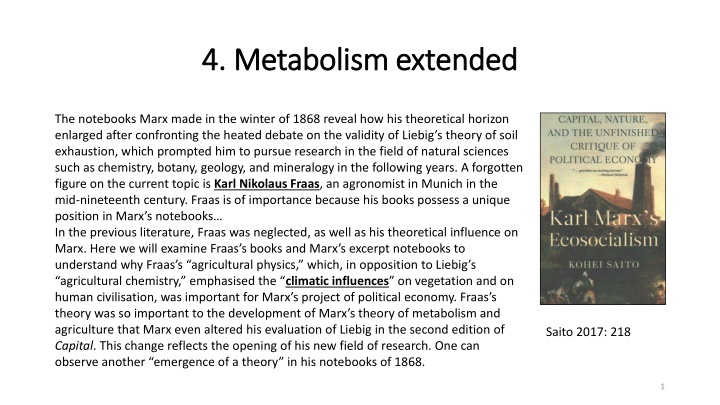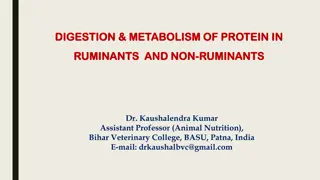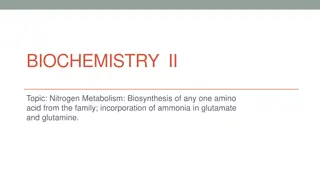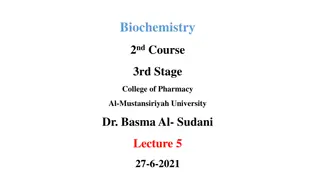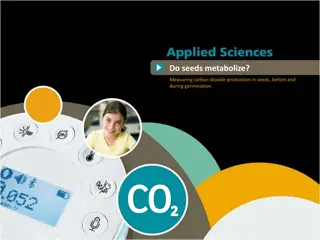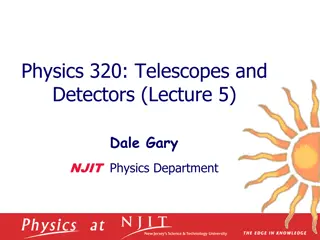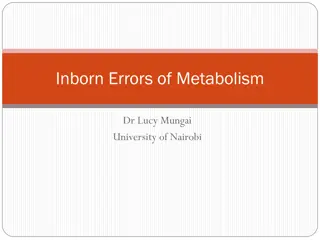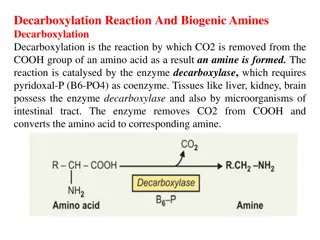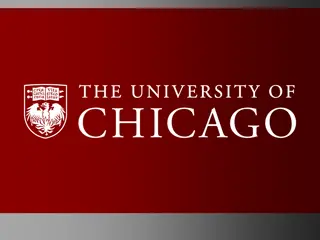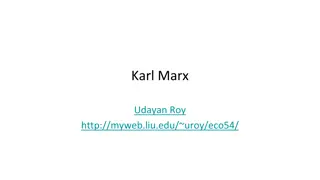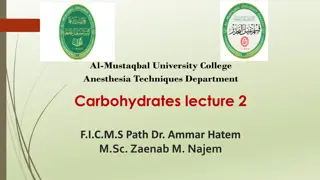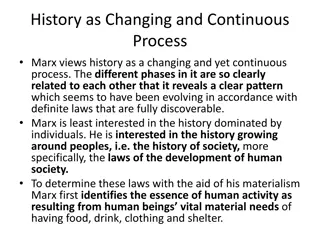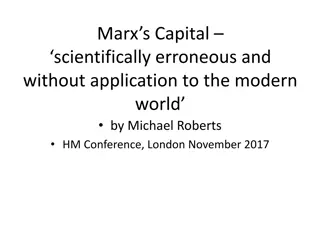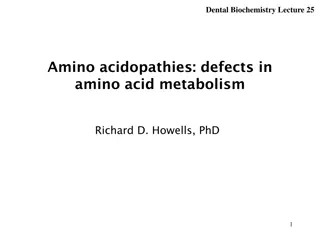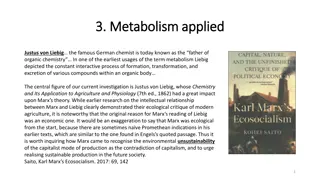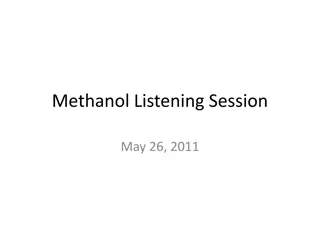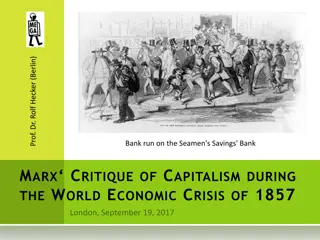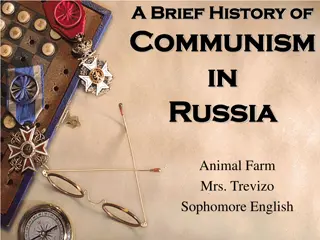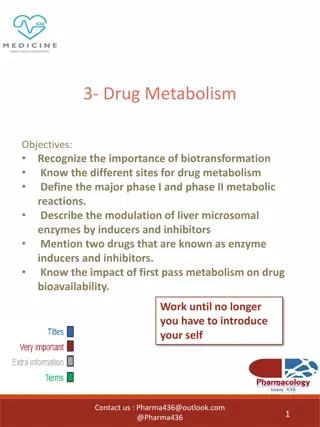Marx's Exploration of Agriculture and Metabolism Through the Lens of Fraas's Theory
Marx's notebooks from 1868 reveal his expanded theoretical perspective influenced by Karl Nikolaus Fraas, an agronomist in the mid-19th century. Fraas's agricultural physics, focusing on climatic influences on vegetation and civilization, played a crucial role in Marx's development of the theory of metabolism and agriculture. By examining Fraas's works and Marx's excerpts, we uncover how Fraas's ideas challenged Liebig's agricultural chemistry and shaped Marx's understanding of cultivation, climate, and societal impact on agriculture.
Uploaded on Oct 09, 2024 | 1 Views
Download Presentation

Please find below an Image/Link to download the presentation.
The content on the website is provided AS IS for your information and personal use only. It may not be sold, licensed, or shared on other websites without obtaining consent from the author.If you encounter any issues during the download, it is possible that the publisher has removed the file from their server.
You are allowed to download the files provided on this website for personal or commercial use, subject to the condition that they are used lawfully. All files are the property of their respective owners.
The content on the website is provided AS IS for your information and personal use only. It may not be sold, licensed, or shared on other websites without obtaining consent from the author.
E N D
Presentation Transcript
4. Metabolism extended 4. Metabolism extended The notebooks Marx made in the winter of 1868 reveal how his theoretical horizon enlarged after confronting the heated debate on the validity of Liebig s theory of soil exhaustion, which prompted him to pursue research in the field of natural sciences such as chemistry, botany, geology, and mineralogy in the following years. A forgotten figure on the current topic is Karl Nikolaus Fraas, an agronomist in Munich in the mid-nineteenth century. Fraas is of importance because his books possess a unique position in Marx s notebooks In the previous literature, Fraas was neglected, as well as his theoretical influence on Marx. Here we will examine Fraas s books and Marx s excerpt notebooks to understand why Fraas s agricultural physics, which, in opposition to Liebig s agricultural chemistry, emphasised the climatic influences on vegetation and on human civilisation, was important for Marx s project of political economy. Fraas s theory was so important to the development of Marx s theory of metabolism and agriculture that Marx even altered his evaluation of Liebig in the second edition of Capital. This change reflects the opening of his new field of research. One can observe another emergence of a theory in his notebooks of 1868. Saito 2017: 218 1
Marx on Fraas Marx on Fraas Fraas s name first appears in Marx s notebook December 1867 and January 1868 (MEGA 2 IV/32). Very interesting is the book by Fraas (1847): Climate and the Plant World Over Time: A Contribution to the History of Both, namely as proving that climate and flora change in historical times. He is a Darwinist before Darwin, and admits even the species developing in historical times. But he is at the same time an agronomist. He claims that with cultivation depending on its degree the moisture so beloved by the peasants gets lost (hence also the plants migrate from south to north), and finally steppe formation occurs. The first effect of cultivation is useful, but finally devastating through deforestation, etc. This man is both a thoroughly learned philologist (he has written books in Greek) and a chemist, agronomist, etc. The conclusion is that cultivation when it proceeds in natural growth and is not consciously controlled (as a bourgeois he naturally does not reach this point) leaves deserts behind it, Persia, Mesopotamia, etc., Greece. So once again an unconscious socialist tendency! His history of agriculture is also important. He calls Fourier this pious and humorous socialist It is necessary to keep a close watch on the recent and very latest in agriculture. The physical school is pitted against the chemical. Marx (25 March 1868) Letter to Engels. MECW 42: 558-59 2
Fraas: climate and plant growth Fraas: climate and plant growth To the extent that favourable climatic conditions are missing to the cultivated plants and cannot be replaced somehow, we must open up the sources of nutrition in the soil, that is, we must dung better. [It is] not because cereals consume more ash constituents (mineral constituents) than meadow plants, but because they are alien to our climate and do not have enough warmth to assimilate salts of the soil as well as gases of the air into our desired amount of organic substance within an artificially and naturally measured time of vegetation In southern Europe cereals (barley) can be quite successfully cultivated on the same land every year for many years even without rotation and without manure, maybe not corn and cotton, but at least melons Cereals are thus soil-exhausting plants in the cold temperature zone as they strongly require favourable climate, particularly corn, durra, wheat, barley, rye and oat, legumes and buckwheat less so, and clovers, our pasture, asparagus etc. not at all. In the warm and moderate temperature zone cereals and legumes are no longer soil-exhausting plants with exception of corn, rice and durra, but hardly tobacco that is already cultivated often without manure. Fraas, quoted in Marx, MEA Sign B 111, 2, 17 3
Fraas Fraas: climate : climate and deforestation and deforestation Deforestation of a region, particularly when it possesses a very arid and sandy or furthermore even calcareous soil, is counted as the most powerful cause for creating heat The composition of the soil [conditions] the rainfall, from which the climatic influences described above follow. The forested areas covered by vegetation retain moisture more firmly and are less heated up by sunlight than infertile areas. [As a result,] they also attract more rainfall, and thus these areas are not just cool but also distribute refreshing cool airstream to hot surrounding areas. The distribution of moisture in the air greatly changes temperature and various capacities of heat conduction of matter on the surface of the earth The great transformation of climate and change of vegetation are most convincingly proved by an escalating steppe formation and the transition to a complete desert in the places the ancient people knew as the most fruitful regions of the world. The unique, loose, saliferous soil in very fertile Mesene used to be covered by grus sand and mud in every flooding. But if this soil is not constantly irrigated, covered by mud and then drained, it is exposed to a unique transformation, one similar to the decomposition of mud of the Nile river in Egypt or the coasts in Greece. Fraas, quoted in Marx, MEA, Sign. B 112, 46, 49 4
Commerce and industry the biggest enemy of nature Commerce and industry the biggest enemy of nature Man in various ways changes his environment, on which he is quite dependent, and he changes nature more than one usually imagines. In fact, he is able to change nature to such an extent that later it completely malfunctions as the indispensable means for the realisation of a higher level of mental and physical development, forcing him to confront extreme physical obstacles There is no hope of overcoming this reality The biggest enemy [of nature is] cultivation accompanied by commerce and industry Trees in mountain areas should never be cut down without the highest necessity because they are most influential. Fraas, Klima und Pflanzenwelt. 1847: 59, 68, 136 The extinction of species is still going on (Man himself [is] the most active exterminator). Marx, MEGA 2, IV/26. 2011: 233 5
Session 4. Metabolism extended Session 4. Metabolism extended Key ideas Climate change Deforestation Desertification Extinction Questions 1) What does Marx take from his reading of Fraas? 2) How does deforestation create deserts? 3) What does Fraas believe causes climate change? 4) How did Marx view human extinction? 6
